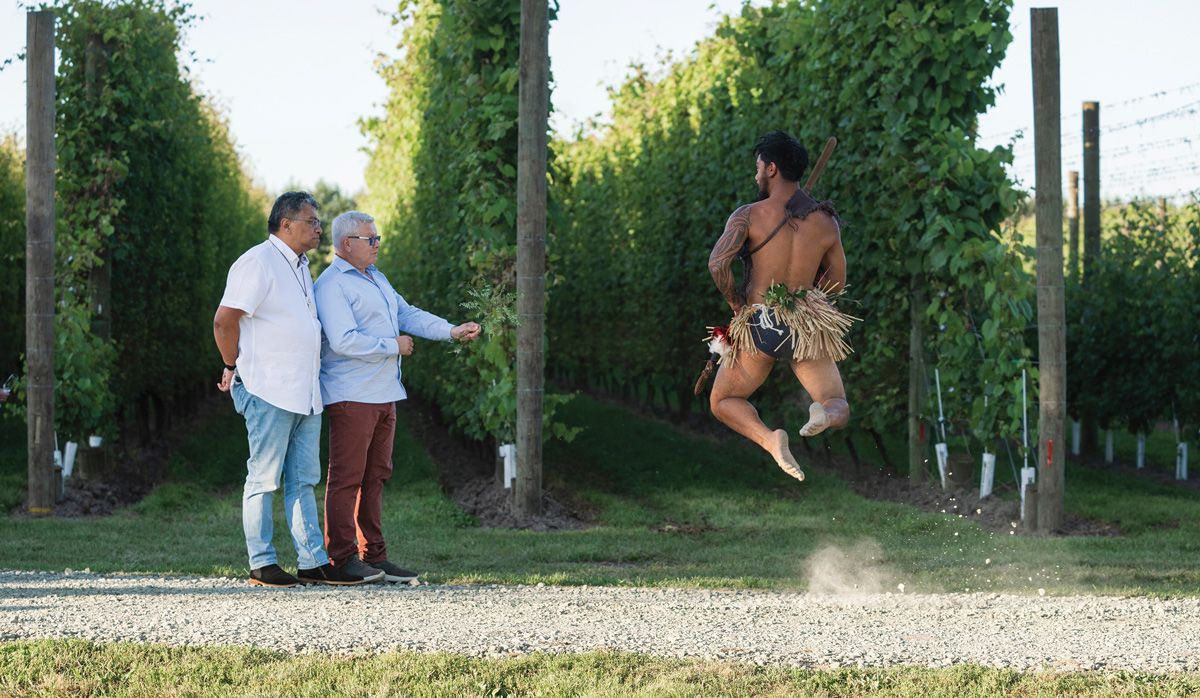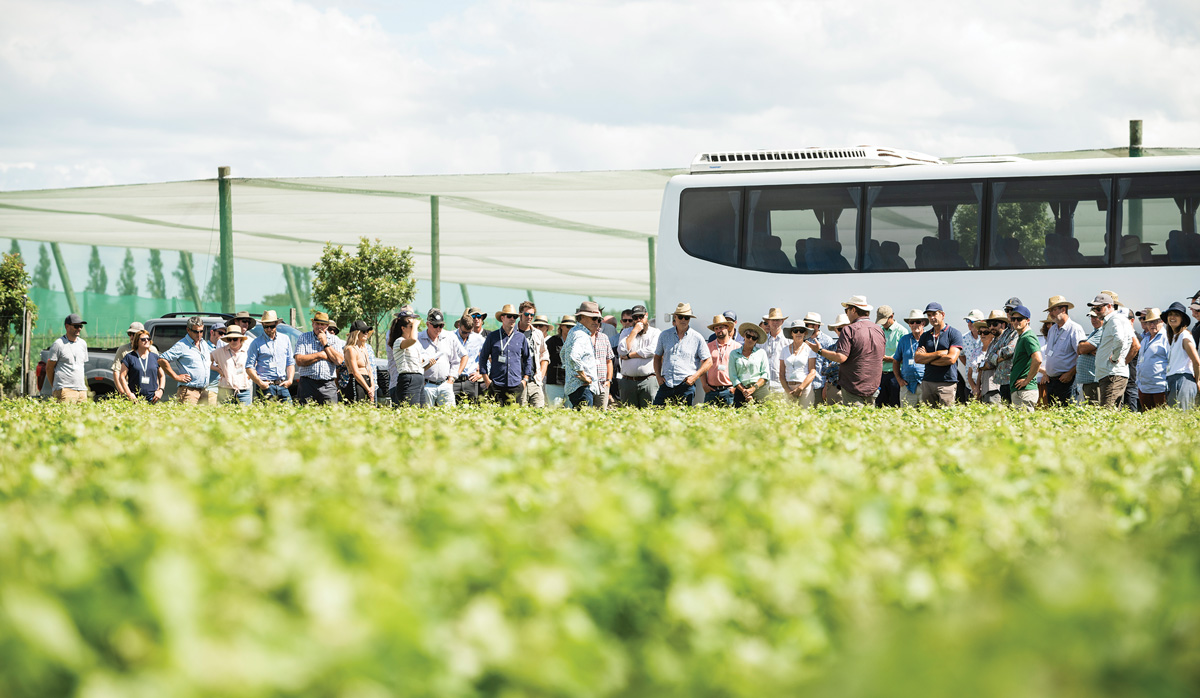Where old meets new
There is something very impressive about walking through Riversun's source block in Gisborne.
"We need to come together to weave a new legacy."
Riversun Nursery's Vision 40:40 was opened in characteristically eloquent and inspirational fashion by Dame Anne Salmond, setting the tone for the two-day workshop that brought together a cross-section of industry figures to discuss the past 40 years and ponder the 40 yet t come.
Originally intended as a party to belatedly celebrate Riversun's 40th anniversary, the Gisborne event morphed into something far greater. With a field trip to the nursery blocks to get a glimpse of where the magic happens, and a La Paulée-style celebration dinner, Vision 40:40 was a stimulating, thought-provoking event, imbued with Riversun founder Geoff Thorpe and his wife Anna's remarkable generosity of spirit, connection to their community and practical, clear-eyed vision.
This was not a public-facing event (I was invited as the MC for the dinner), and attendees shared their stories with frankness. Therefore, my review attempts to convey its tone while respecting the confidentiality of those who participated.
Vision 40:40 was a timely and welcome forum. Riversun's timespan runs roughly parallel to that of the modern New Zealand industry, which is undergoing an inflection point as the pioneers start to hang up their pruning snips and hand over to the next generation - or perhaps to an entirely new ownership model. The past few years' Covid-induced border closures and event cancellations contributed to the disappearance of many industry focal points, leaving a sense of isolation and a vacuum in collaborative discussion. The opportunity to share stories, triumphs and frustrations, successes and learning curves honestly and transparently, was felt profoundly by many.
 |
|---|
|
Laurent Audeguin from ENTAV accepting the wero. |
The questions - "who are we, what do we stand for, and what's our place in the world?" - occupied many minds. The concern is that we no longer seem to have a strong, unified message and mindset, and that without a clearly articulated vision from the top down, it will be hard to maintain any international renown we have accumulated. This tied into recognition of the increasing bifurcation of New Zealand's industry - on one hand the behemoth that is large-scale "Marlborough Sauvignon Blanc" (MSB), and on the other, "Everyone Else" (some of whom might themselves be producers of MSB). The MSB story did not begin with high volume/bulk wines, but instead with small, passionate producers who are now finding it an increasingly tough space to occupy. This is not about reductive thinking such as "Big = Bad" and "Small = Good", as each one has a valuable role to play when they are striving for the same ultimate goals for New Zealand Win Inc. However, it is clear that not everyone is thriving in the current landscape, and it is not healthy if there is only one main viable economic model, built upon one variety at scale. We have an enviable reputation to protect and maintain, and producers on whose reputation New Zealand's quality perception rests must be able to flourish alongside those with the size and clout to blaze market trails. We are stronger together.
To do this, producers need to make quality the key driver of their identity and have confidence that their peers' wines will also be of high quality. Our famously laidback national persona must not become a barrier to marketing our wines at a higher level. Our best wines, particularly Pinot Noir, are bargains compared to our new world competitors. The stratospheric pricing of Burgundy has opened doors for wines offering better value, on which we must capitalise. The success of New Zealand wines in marketplaces such as the Place de Bordeaux shows the opportunity is there is we are willing to take it.
Should protocols be in place to assist this? The "Champagne-ification" of MSB was mooted since it shares many of the same attributes: benchmark style and quality, price premiums, natural production constraints, and demand exceeding supply. However, MSB faces challenges in its distance from markets, production costs and potentially, consumer trends. It remains to be seen whether Champagne's other features such as yield control and bottling at source are palatable to MSB's producers, through Appellatin Marlborough Wine has thrown down this gauntlet. A fascinating question was posed: are we better selling variety or origin? One can be replicated anywhere, the other most certainly cannot... at what point will be the regional or vineyard name on a bottle of New Zealand wine start to eclipse that of the variety? We have taken some big (and at times radical) steps in our short history: vine pulls, Sustainable Winegrowing New Zealand, screwcaps are some examples. With the luxury of hindsight into the pros and cons of European wine laws, perhaps this area could be our next big move.
The second overarching theme was the incoming challenges of climate change, brought into sharp relief by the Auckland flooding that preceded the workshop, and devastatingly underscored by Cyclone Gabrielle just a week later. New Zealand is in no way immune to the impacts and there are many challenges, with few easy answers. Are we preparing for floods, droughts, or both? Combined with the challenges of increasing disease pressure (and the associated spraying implications) the uncertainty of climate change takes a toll and brings a reckoning of what tools we actually have in the bag. There were persuasive discussions about the benefits of regenerative and organic viticulture for sequestering carbon, managing water, building biodiversity, and ensuring healthy soils that span generations. The current, and especially the next generation, are facing a future that looks very different, with many more unknowns, from those who came before them.
Our industry has shown it can unite behind an idea to become a world leader. There is opportunity (to coin one of Geoff's phrases) to set a "Big Hairy Audacious Goal" and have our industry lead the way in regenerative and organic agriculture, and to provide benchmark frameworks for quality within a New World context. We are still small and potentially nimble enough for this to be a realistic goal, though we need to be brave and innovative with strong leadership. Vision 40:40 gave a welcome opportunity to imagine how New Zealand wine will be standing in the decades to come, based on the decisions we are making now. For as Dame Anne, who also happens to be Geoff's big sister, said: "People come and go but the land always stands."
Hybrids - The Future Is Already Here?
Hybrid vines are an area where there is currently little visible industry discussion. The opportunity to discuss and taste four varieties was eye-opening. Made from varieties resistant to powdery and downy mildew (Nuvoté, Floreal, Sauvignon Rytos and Sauvignon Nepsis - with the latter two having Sauvignon Blanc as one parent), three were microvins and one a commercial wine. For me the standout was Sauvignon Blanc lookalike S. Nepsis. It wasn't hard to imagine 15% of Nepsis in the mix for its spray-reduction potential. Will we continue to use the current limited arsenal or could there be major change coming? Currently there are no vines in New Zealand, and quarantines space is an ongoing limiting factor, but Riversun is already well advanced in gaining licensed access to these varieties. Watch this space.
 |
|---|
|
|
Riversun
Founded in 1982, Gisborne's Riversun Nurseries and Geoff Thorpe are familiar names within the New Zealand winescape, having become the country' leading supplier of rootstock and grafted vines, as well as avocado and kiwifruit plants. Geoff has been a pioneer and visionary developing an independently audited vine certification programme, a grapevine quarantine facility, and (via sister company Linnaeus Laboratories) an accredited vine virus testing service. Riversun's 100 hectare holdings encompass a grapevine source block, field nursery, processing facility and potted plant nursery, employing about 80 permanent staff, rising to 250 across the peak season. Geoff has made a significant commitment to sustainability, guided by his litmus test of "can we keep doing this on the same land, in the same community and on the same planet for the next 100 years and the next 1000 years?" Riversun became a Toitu carboNZero certified organisation in 2018 and is aiming to be climate positive by 2030.
Jimmy Stewart is quite literally chipping away at circularity.
A Wine Marlborough Lifetime Achievement Award is “very premature”, say Kevin and Kimberley Judd, nearly 43 years after they came…
Wine tourism has evolved into a sophisticated, diverse and resilient part of the New Zealand wine sector's economy. Emma Jenkins MW talks…